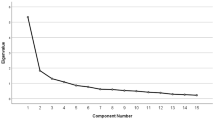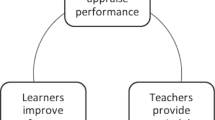Abstract
An essential goal of evaluation is to foster learning. Across the medical education spectrum, evaluation of clinical performance is dominated by subjective feedback to learners based on observation by expert supervisors. Research in non-medical settings has suggested that participants’ perceptions of evaluation processes exert considerable influence over whether the feedback they receive actually facilitates learning, but similar research on perceptions of feedback in the medical setting has been limited. In this review, we examine the literature on recipient perceptions of feedback and how those perceptions influence the contribution that feedback makes to their learning. A focused exploration of relevant work on this subject in higher education and industrial psychology settings is followed by a detailed examination of available research on perceptions of evaluation processes in medical settings, encompassing both trainee and evaluator perspectives. We conclude that recipients’ and evaluators’ perceptions of an evaluation process profoundly affect the usefulness of the evaluation and the extent to which it achieves its goals. Attempts to improve evaluation processes cannot, therefore, be limited to assessment tool modification driven by reliability and validity concerns, but must also take account of the critical issue of feedback reception and the factors that influence it. Given the unique context of clinical performance evaluation in medicine, a research agenda is required that seeks to more fully understand the complexity of the processes of giving, receiving, interpreting, and using feedback as a basis for real progress toward meaningful evaluation.
Similar content being viewed by others
References
Accreditation Council for Graduate Medical Education. (2007). Common program requirements (Revised July 1, 2007). Accessed December 16, 2009. http://www.acgme.org.
Awad, S. S., Liscum, K. R., Aoki, N., Awad, S. H., & Berger, D. H. (2002). Does the subjective evaluation of medical student surgical knowledge correlate with written and oral exam performance? Journal of Surgical Research, 104, 36–39.
Barclay, L. J., Skarlicki, D. P., & Pugh, S. D. (2005). Exploring the role of emotions in injustice perceptions and retaliation. Journal of Applied Psychology, 90(4), 629–643.
Barrows, H. S. (1986). The scope of clinical education. In J. A. D. Cooper (Ed.), Clinical education of medical students. Journal of Medical Education, 61(9 Part 2), 23–33.
Bing-You, R. G., Bertsch, T., & Thompson, J. A. (1998). Coaching medical students in receiving effective feedback. Teaching and Learning in Medicine, 10(4), 228–231.
Bing-You, R. G., & Paterson, J. (1997). Feedback falling on deaf ears: Residents’ receptivity to feedback tempered by sender credibility. Medical Teacher, 19(1), 40–44.
Bing-You, R. G., & Trowbridge, R. L. (2009). Why medical educators may be failing at feedback. JAMA, 302(12), 1330–1331.
Boehler, M. L., Rogers, D. A., Schwind, C. J., Mayforth, R., Quin, J., Williams, R. G., et al. (2006). An investigation of medical student reactions to feedback: A randomised controlled trial. Medical Education, 40, 746–749.
Brett, J. F., & Atwater, L. E. (2001). 360° feedback: Accuracy, reactions, and perceptions of usefulness. Journal of Applied Psychology, 86(5), 930–942.
Chou, S., Lockyer, J., Cole, G., & McLaughlin, K. (2008). CanMEDS evaluation in Canadian postgraduate training programmes: Tools used and programme director satisfaction. Medical Education, 42, 879–886.
Claridge, J. A., Calland, J. F., Chandrasekhara, V., Young, J. S., Sanfey, H., & Schirmer, B. D. (2003). Comparing resident measurements to attending surgeon self-perceptions of surgical educators. American Journal of Surgery, 185, 323–327.
Colletti, L. M. (2000). Difficulty with negative feedback: Face-to-face evaluation of junior medical student clinical performance results in grade inflation. Journal of Surgical Research, 90(1), 82–87.
Daelmans, H. E. M., Overmeer, R. M., van der Hem-Stokroos, H. H., Scherpbier, A. J. J. A., Stehouwer, C. D. A., & van der Vleuten, C. P. M. (2006). In-training assessment: Qualitative study of effects on supervision and feedback in an undergraduate clinical rotation. Medical Education, 40, 51–58.
Davis, M. H., & Harden, R. M. (2003). Competency-based assessment: Making it a reality. Medical Teacher, 25(6), 565–568.
Davis, D. A., Mazmanian, P. E., Fordis, M., et al. (2006). Accuracy of physician self-assessment compared with observed measures of competence: A systematic review. JAMA, 296, 1094–1102.
De Cremer, D., van Knippenberg, B., van Knippenberg, D., Mullenders, D., & Stinglhamber, F. (2005). Rewarding leadership and fair procedures as determinants of self-esteem. Journal of Applied Psychology, 90(1), 3–12.
Dipboye, R. L., & de Pontbriand, R. (1981). Correlates of employee reactions to performance appraisals and appraisal systems. Journal of Applied Psychology, 66(2), 248–251.
Dudek, N. L., Marks, M. B., & Regehr, G. (2005). Failure to fail: The perspectives of clinical supervisors. Academic Medicine, 80(10 Suppl), S84–S87.
Duffield, K. E., & Spencer, J. A. (2002). A survey of medical students’ views about the purposes and fairness of assessment. Medical Education, 36(9), 879–886.
Ende, J. (1983). Feedback in clinical medical education. JAMA, 250(6), 777–781.
Epstein, R. M. (2007). Assessment in medical education. New England Journal of Medicine, 356(4), 387–396.
Eva, K. W., & Regehr, G. (2005). Self-assessment in the health professions: A reformulation and research agenda. Academic Medicine, 80(10 Suppl), S46–S54.
Evans, R., Elwyn, G., & Edwards, A. (2004). Review of instruments for peer assessment of physicians. BMJ, 328(7450), 1240.
Fromme, H. B., Karani, R., & Downing, S. M. (2009). Direct observation in medical education: Review of the literature and evidence for validity. Mount Sinai Journal of Medicine, 76(4), 365–371.
Gray, J. D. (1996). Global rating scales in residency education. Academic Medicine, 71(1 Suppl), S55–S63.
Haber, R. J., & Avins, A. L. (1994). Do ratings on the American board of internal medicine resident evaluation form detect differences in clinical competence? Journal of General Internal Medicine, 9, 140–145.
Hasley, P. B., & Arnold, R. M. (2009). Summative evaluation on the hospital wards. What do faculty say to learners? Advances in Health Sciences Education: Theory and Practice, 14(3), 431–439. Epub 2008 Jun 5.
Higgins, R. S. D., Bridges, J., Burke, J. M., O’Donnell, M. A., Cohen, N. M., & Wilkes, S. B. (2004). Implementing the ACGME general competencies in a cardiothoracic surgery residency program using 360-degree feedback. Annals of Thoracic Surgery, 77, 12–17.
Higgins, R., Hartley, P., & Skelton, A. (2001). Getting the message across: The problem of communicating assessment feedback. Teaching in Higher Education, 6(2), 269–274.
Ilgen, D. R., Fisher, C. D., & Taylor, M. S. (1979). Consequences of individual feedback on behaviour in organizations. Journal of Applied Psychology, 64, 349–371.
Isaacson, J. H., Posk, L. K., Litaker, D. G., & Halperin, A. K. (1998). Resident perception of the evaluation process (abstract). Journal of General Internal Medicine, 10(suppl), 89.
Kluger, A. N., & DeNisi, A. (1996). The effects of feedback interventions on performance: A historical review, a meta-analysis, and a preliminary feedback intervention theory. Psychological Bulletin, 119(2), 254–284.
Kolars, J. C., McDonald, F. S., Subhiyah, R. G., & Edson, R. S. (2003). Knowledge base evaluation of medicine residents on the gastroenterology service: Implications for competency assessments by faculty. Clinical Gastroenterology and Hepatology, 1, 64–68.
Krupat, E., & Dienstag, J. L. (2009). Commentary: Assessment is an educational tool. Academic Medicine, 84(5), 548–550.
Kwolek, C. J., Donnelly, M. B., Sloan, D. A., Birrell, S. N., Strodel, W. E., & Schwartz, R. W. (1997). Ward evaluations: Should they be abandoned? Journal of Surgical Research, 69(1), 1–6.
Lawler, E. E. (1967). The multitrait-multirater approach to measuring managerial job performance. Journal of Applied Psychology, 51, 369–381.
Liason Committee on Medical Education. (2008). Current LCME accreditation standards: Structure and function of a medical school (Revised June, 2008). Accessed December 16, 2009. http://www.lcme.org.
Meyer, H. H. (1975). The pay-for-performance dilemma. Organizational Dynamics, 3, 39–50.
Meyer, H. H., Kay, E., & French, J. R. P. (1965). Split roles in performance appraisal. Harvard Business Review, 42(1), 123–129.
Miller, G. E. (1990). The assessment of clinical skills/competence/performance. Academic Medicine, 65(9), S63–S67.
Mowday, R. T. (1983). Beliefs about the causes of behaviour: The motivational implications of attribution processes. In R. M. Steers & L. W. Porter (Eds.), Motivation and work behavior (3rd ed.). New York: McGraw-Hill.
Pasquina, P. F., Kelly, S., & Hawkins, R. E. (2003). Assessing clinical competence in physical medicine and rehabilitation residency programs. American Journal of Physical Medicine and Rehabilitation, 82, 473–478.
Pearce, J. L., & Porter, L. W. (1986). Employee responses to formal performance appraisal feedback. Journal of Applied Psychology, 71(2), 211–218.
Sargeant, J., Mann, K., & Ferrier, S. (2005). Exploring family physicians’ reactions to multisource feedback: Perceptions of credibility and usefulness. Medical Education, 39, 497–504.
Sargeant, J., Mann, K., Sinclair, D., van der Vleuten, C., & Metsemakers, J. (2008). Understanding the influence of emotions and reflection upon multi-source feedback acceptance and use. Advances in Health Sciences Education Theory Practice, 13, 275–288.
Sender Liberman, A., Liberman, M., Steinert, Y., McLeod, P., & Meterissian, S. (2005). Surgery residents and attending surgeons have different perceptions of feedback. Med Teach, 27(5), 470–472.
Short, J. P. (1993). The importance of strong evaluation standards and procedures in training residents. Academic Medicine, 68(7), 522–525.
Sumit, K. De., Henke, P. K., Ailawadi, G., Dimick, J. B., & Colletti, L. M. (2004). Attending, house officer, and medical student perceptions about teaching in the third-year medical school general surgery clerkship. Journal of the American College of Surgeons, 199, 932–942.
The Royal College of Physicians and Surgeons of Canada. (2006). General standards of accreditation (Revised June 2006). Accessed December 16, 2009. http://www.rcpsc.edu.
Thompson, P. H., & Dalton, G. W. (1970). Performance appraisal: Managers beware. Harvard Business Review, 48, 149–157.
Turnbull, J., Gray, J., & MacFadyen, J. (1998). Improving in-training evaluation programs. Journal of General Internal Medicine, 13, 317–323.
Watling, C. J., Kenyon, C. F., Schulz, V., et al. (2010). First do no harm: Challenges to faculty engagement in the resident in-training evaluation process. Academic Medicine, 85, 7.
Watling, C. J., Kenyon, C. F., Zibrowski, E. M., et al. (2008). Rules of engagement: Residents’ perceptions of the in-training evaluation process. Academic Medicine, 83(10 Suppl), S97–S100.
Yorke, M. (2003). Formative assessment in higher education: Moves toward theory and the enhancement of pedagogic practice. Higher Education, 45, 477–501.
Author information
Authors and Affiliations
Corresponding author
Rights and permissions
About this article
Cite this article
Watling, C.J., Lingard, L. Toward meaningful evaluation of medical trainees: the influence of participants’ perceptions of the process. Adv in Health Sci Educ 17, 183–194 (2012). https://doi.org/10.1007/s10459-010-9223-x
Received:
Accepted:
Published:
Issue Date:
DOI: https://doi.org/10.1007/s10459-010-9223-x




